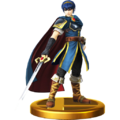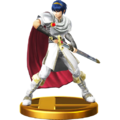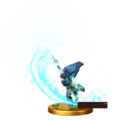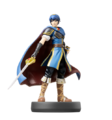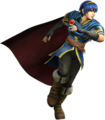Marth (SSB4)
| Marth in Super Smash Bros. 4 | |
|---|---|
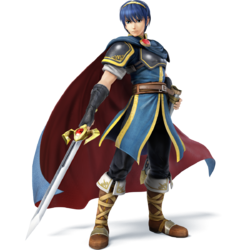 
| |
| Universe | Fire Emblem |
| Other playable appearances | in Melee in Brawl |
| Availability | Starter |
| Final Smash | Critical Hit |
| Tier | A (11) |
Marth (マルス, Marth) is a playable character in Super Smash Bros. 4. He was announced on the official website on November 7th, 2013; years before, four Fire Emblem games were released within a similar time frame; Fire Emblem on November 3rd, 2003 in North America, The Sacred Stones and Path of Radiance on November 4th, 2005 in Europe, and Radiant Dawn on November 11th, 2007 in North America. He was among the first wave of amiibo figures that are compatible with SSB4, released on the same day as the Wii U version of the game. He is voiced once again by Hikaru Midorikawa in all regions, albeit using recycled voice clips from Brawl.
Marth currently ranks 11th out of 55 characters on the tier list, tied with Ryu in the bottom of A tier. This is a minor fall from his 5th place position out of 38 in Brawl. However, due to the expansion of tiers in SSB4, Marth remains a top tier character, as in all of his past appearances. Marth's positives include good overall mobility and relatively long disjointed range on all of his attacks. As with previous incarnations, all of Marth's sword-based attacks are quite rewarding if they land only at the tip of his sword, with the buffs to his tippered moves now causing them to deal absurdly high knockback despite their quick startup, most notably in the case of forward smash, forward/back aerials, and Shield Breaker. The changes to shield mechanics also indirectly grant his tippers more safety due to them causing higher shieldstun, making it difficult for opponents to punish tippers on shield. In addition, his overall frame data is very good, such as possessing one of the lowest landing lag averages in the game, and as alluded to above, the startup of his moves is also very fast, with most of his moveset coming out before frame 10, and certain moves having little endlag to complement this further (neutral attack, forward, up, and down tilts respectively). All in all, Marth's overall speed in regards to both attacks and mobility give him a dependable neutral game, with optimal spacing being very rewarding due to the danger of his powerful tippers.
Marth's primary flaw is his emphasis on spacing, moreso than in his previous appearances, owing to the reduction in power and efficacy of his sourspotted moves. Furthermore, many of Marth's sourspotted attacks have poor shieldstun, potentially leading to punishes if Marth does not properly space his attacks. Marth is also susceptible to pressure tactics, as he lacks combo breaker attacks and his lack of a projectile prevents him from easily dealing with projectile-based camping. Like in his previous appearances, Marth also suffers from a linear, predictable recovery, and even with ledge trumping and larger ledge sweetspots, Marth is still prone to gimping.
Initially considered a low-tier character in Smash 4, Marth was buffed via updates to the game, particularly in 1.1.4, owing to improvements to his reach, damage, interruptibility, and combo game. Marth went from 41st on the first tier list to 11th on the fourth most current tier list, and after struggling to make an impact at tournaments, he now commands a large playerbase and above-average tournament representation.
Attributes
Marth is emblematic of sword characters, making extensive use of disjointed hitboxes and his unique tipper mechanic. His attributes remain present: he has high overall mobility, sporting the fastest walking speed in the game (tied with his clone, Lucina), a fast dashing speed, average air speed, above average air acceleration, moderate falling speed, and low gravity, all of which is coupled with slightly below average weight.
Marth's playstyle has remained fundamentally intact from past iterations, being characterized by the properties of his sword, the Falchion. His attacks deal significantly more damage and knockback if struck with the tip of the sword, encouraging and rewarding proper spacing. Being a sword-user, Marth also has the benefit of disjointed hitboxes. Many of his moves possess good range, fast startup, and cover wide arcs (e.g, his jab, up tilt, and forward aerial). As such, Marth aims to fight a step away from danger, where he can pressure the opponent without leaving himself open to punishment.
Marth's neutral game relies heavily on effective spacing. As mentioned before, Marth possesses one of the longest overall ranges in the game, which plays a vital role in his neutral, as his mobility allows him to maneuver around opponents and space attacks with relative ease, with multiple moves that are safe to throw out at tipper range or further. In comparison to Melee and Brawl, Marth's neutral game is mainly ground based, with the first hit of his jab being the cornerstone. Said move is fast, disjointed, has high range, low start up, deceptively low cooldown, and due to its hitbox arc, also acts as an anti-air. All of these traits make it exceptionally difficult to challenge. It also has excellent combo potential into many of his moves.
While his tipper is considered the most optimal, Marth's sourspot also provides benefits when he wins in the neutral, as the lower knockback on his sourspot allows him to more easily combo moves into themselves. Marth's neutral game is also unique by scaling with percent, as set-ups and combos become more rewarding at higher percents (e.g, jab 1 to forward tilt serves as a KO set-up at later percents). He also benefits from being one of the few characters in the game who can outright KO through playing his neutral and spacing game; essentially, while Marth's neutral reward is not as rewarding or damaging as other characters, Marth has the ability to win neutral exchanges with relative ease and safety, as well as having consistent set-ups and follow-ups.
Marth's special moveset has high utility. His neutral special, Shield Breaker, deals high shield damage even when uncharged, and is useful for punishing rolls or covering landings. It also grants some horizontal recovery, moreso when fully charged, and a tippered blow deals enough knockback to KO at reasonably low percents. Side special Dancing Blade is a four-hit combo that can be used to punish sidesteps and rolls, is an effective damage racker, dealing 15-20% if all hits connect, has combo and mix-up potential, and at later percents, serves as an effective KO option. It can also be used to stall in the air, giving Marth mix-up opportunities to recover, land, and edgeguard. Counter, his down special, provides him with the capability to reverse attacks with 1.2x the damage, KOing if the attack was strong enough; it can also be used against opponents with easily predictable recoveries. His up special, Dolphin Slash, has quick startup, provides slight intangibility during its startup frames, is relatively strong when it first comes out, and has high knockback scaling. These attributes make it an excellent out of shield option and combo-breaker. It is also Marth's primary method of recovery, as its speed can make it difficult to intercept, and it can stage spike reckless edgeguarders.
Marth's low gravity and average falling speed allow him to maneuver effectively in the air, and his disjointed range provides him with an innately strong edgeguarding capability. His forward and back aerials have fast startup and good range, and are strong when tippered. Down aerial is relatively quick, and it will powerfully meteor smash opponents if it hits at the center of the arc, though its timing is very strict at one frame. Forward smash's range makes it a good choice against opponents aiming their recoveries towards the ledge, and down tilt's range and speed make it good at 2-framing opponents. Both have the ability to hit below the ledge as well.
Despite his strengths, Marth is not without flaws. Due to both the changes to shield mechanics and further polarization of his sweetspots and sourspots, his heavier reliance on tippers and spacing ability gives him a relatively subpar up-close game at higher percents, which makes it more difficult for Marth to KO and threaten faster/smaller characters. The low shieldstun and hitstun generated by non-tippered moves make it possible for opponents to act out quicker than he can, causing Marth to struggle against shields if his aerials are improperly spaced, and Shield Breaker is highly punishable if predicted. His tipper mechanic can equally disadvantage him when attempting to KO, as his attacks don't generate much knockback if not spaced properly, making his KO potential very inconsistent without proper spacing (most notably with forward smash, forward tilt and aerials). Lastly, his edgeguarding ability, though strong, is flawed, both due to the need for tippers and the moderately high ending lag on his aerials. As a result, Marth is reliant on being in a certain distance for his moves to be safe while retaining the neutral, and to KO effectively without setups.
Marth's weak throws tie into his inconsistent KO power. Except for up throw, they have low knockback scaling, preventing them from KOing at realistic percents, while up throw can only KO starting at 160%, if Marth has no rage. His throw game is poor as well; aside from having a fairly fast pummel, Marth's throws deal low damage and have high base knockback, making them poor for combos and damage-racking outside of very low percents, such as aerials at 0%. However, it should be noted that the high base knockback of his throws allow Marth to take advantage of his good edgeguarding capability, especially at the edge.
As a solely sword-based character, Marth's neutral also suffers from a lack of a projectile, and he can struggle against projectile heavy characters and playstyles. This ties in with his vulnerability once he loses the neutral: despite having below average weight and only average falling speed, Marth is susceptible to combos, and his tall hurtbox provides an easy target. Dolphin Slash is his only reliable combo-breaker, but as it leaves him helpless, it can inadvertently put him in an even worse position. Also, while Counter can be used defensively, it leaves Marth extremely vulnerable to punishment should it whiff. Marth also has little defense against juggling, as his aerials are ineffective at relieving pressure; though his attacks have quick startup, many of them come with high ending and landing lag, and also suffer from short hitbox durations (e.g, his forward aerial has a hitbox that lasts only 3 frames, comparatively high ending lag and noticeable landing lag, and along with its very strict autocancel window, it is a surprisingly poor approach option).
Marth himself is somewhat vulnerable to edgeguarding, though he has options for mix-ups with his recovery. Dolphin Slash is his only reliable vertical recovery option, and while it is still a threat to edgeguarders due to its speed and high stage spike ability, its path is linear and its distance fixed, making it fairly predictable. Additionally since this move grants little horizontal distance, Marth is vulnerable to semi-spikes. While Shield Breaker can aid his horizontal recovery, it covers little distance without charging. Marth's also heavily reliant on his double jump for mix-ups in his recovery, and is in significant danger if offstage without it.
With custom moves enabled, Marth gains options to address some of his drawbacks, at the cost of creating different ones. Dashing Assault allows him to punish landings and rolls, create trap situations, and can force opponents off the stage; but it loses the power and utility of Shield Breaker. Crescent Slash provides more horizontal recovery, but less vertical recovery. Also, while it grants him a fairly reliable follow-up from his forward throw and aerials at low percents, and can punish airdodge landings, it loses out of shield functionality. Dolphin Jump provides Marth more vertical distance and greater horizontal control, but loses all of its offensive use. Iai Counter has quicker startup (active from frame 3), increased utility, and deals electric damage as well; however it requires significantly stricter timing.
Overall, Marth's strengths considerably outweigh his flaws. He possesses notable advantages in his tipper mechanic, effective disjoint, fast mobility, above-average frame data, and a sourspot to benefit his combo game; however, his spacing and overall safety is so overly centered on his tipper mechanic that it hinders him in many ways, making his punishes unreliable due to their inconsistency. At his purest, Marth is most rewarding for players with good fundamentals, with many playstyles applicable to him due to his flaws being easily worked around with careful play. Marth has a dedicated playerbase in competitive play, with notable players such as MkLeo, Mr.E, Pugwest, and False achieving strong results at results at top-level play. As such, while he is noticeably nerfed from Brawl, he has proven to be a solid pick in competitive play after his buffs.
Changes from Brawl
Possibly as a result of his dominance in previous appearances, Marth has been nerfed overall in his transition from Brawl to SSB4 during the release of the game. While Marth's disjoint has been slightly increased, he has less range relative to the cast as a result of many characters getting the same treatment, slightly hindering his key advantage from past games (though he still has one of the longest ranges in the game). As a result, this makes it slightly harder for him to control space. Arguably the largest nerf he has received is to his aerial game, another strength in previous iterations: his forward and down aerials have very slightly increased startup; the former has a shorter hitbox duration, higher ending and landing lag, and autocancels much later, hindering his main approach option from Brawl, while the latter's meteor smash only lasts one frame and no longer reaches in front of him, hurting its edgeguarding utility.
Marth's damage racking game has also been nerfed slightly. The base knockback on his throws has been significantly increased, making them ineffective for combos past extremely low percents, and removes his ability to tech-chase. However, their knockback scaling is still low, and so, aside from up throw, they cannot KO realistically. This is further compounded by the removal of chain grabbing, as the low damage output of his throws is more pronounced. His aerials are also less effective for comboing and juggling due to their increased landing lag and (in the case of forward aerial) ending lag. Despite these nerfs, he has not been compensated in the damage output of his individual moves, as all of his smash attacks and aerials deal less damage. As a result of the weakened power of his non-tippered attacks and increased ending lag, his KO power is more inconsistent than before.
However, Marth has received noticeable buffs in other areas. Shield Breaker has improved utility due to the weaker shields and higher shieldstun, and Counter reflects attacks with significantly increased knockback. His moves are significantly stronger when tippered, an example being forward smash, which is now the third strongest in the game. As Dolphin Slash was relatively susceptible to edge-hogging, it greatly benefits from the new ledge mechanics, improving Marth's recovery. His ground game has also been buffed, with his neutral attack, forward tilt, up tilt and down smash all having decreased ending lag, as well as the former launching targets vertically, allowing for many new combo and KO setups he lacked in previous games, which compensates for the loss of the combo ability in his throws. Many of his tipper hitboxes have grown larger as well, and largely benefit from both the increased shieldstun (as of update 1.1.1) and moves with above average hitlag multipliers being safer on shield, improving his spacing game. His mobility options are also far better too, such as possessing a faster dashing speed, but he is more noticeably helped by the general mechanic changes in this area; the removal of random tripping gifts him one of the better and most useful extended dash dances of the game, and the re-addition of perfect pivots gives him yet another microspacing option. Both of these aid his ground game further and give him options to extend his bait and punish options. These changes give him a better grounded spacing and combo game at the cost of having to more properly space and time his aerials.
In the end, while Marth was previously one of the few characters to have been truly nerfed in the transition to Smash 4 (along with Meta Knight, King Dedede, Falco, Jigglypuff and Olimar), game updates brought useful buffs that significantly increased his effectiveness, while his key strengths remain from his previous two iterations, which has lead him to still be considered as a viable character in the current metagame.
Aesthetics
 Marth's design takes elements from Fire Emblem: New Mystery of the Emblem: Heroes of Light and Shadow and his older design in Fire Emblem: Mystery of the Emblem, which was used in Melee and Brawl. His eyes are also smaller, and he has shorter hair.
Marth's design takes elements from Fire Emblem: New Mystery of the Emblem: Heroes of Light and Shadow and his older design in Fire Emblem: Mystery of the Emblem, which was used in Melee and Brawl. His eyes are also smaller, and he has shorter hair. Marth's sword trails are much brighter at the tip; this makes the sweetspot of his attacks more visible than in previous games.
Marth's sword trails are much brighter at the tip; this makes the sweetspot of his attacks more visible than in previous games. Marth's sound effects for his sword slashes are less pronounced than in Brawl, overall being quieter. His Dolphin Slash in particular now produces a soft, short slashing sound, compared to the loud and prolonged noise it produced in Brawl.
Marth's sound effects for his sword slashes are less pronounced than in Brawl, overall being quieter. His Dolphin Slash in particular now produces a soft, short slashing sound, compared to the loud and prolonged noise it produced in Brawl.
Attributes
 Marth is slightly heavier than in Brawl (87 → 90), improving his endurance but making him easier to combo at early percentages from the changes to hitstun cancelling.
Marth is slightly heavier than in Brawl (87 → 90), improving his endurance but making him easier to combo at early percentages from the changes to hitstun cancelling. Almost all of Marth's attacks have slightly increased range compared to Brawl (apart from forward smash and Shield Breaker), ranging from a 0.25 increase to a 3.5 increase (2.5 before 1.1.4, as certain moves were increased further in said patch).
Almost all of Marth's attacks have slightly increased range compared to Brawl (apart from forward smash and Shield Breaker), ranging from a 0.25 increase to a 3.5 increase (2.5 before 1.1.4, as certain moves were increased further in said patch). Marth dashes faster (1.7 → 1.785).
Marth dashes faster (1.7 → 1.785). Marth's air speed is slightly slower (1.034 → 1.02).
Marth's air speed is slightly slower (1.034 → 1.02). Marth falls faster (1.5 → 1.58). This slightly improves his vertical endurance, but makes him more susceptible to combos.
Marth falls faster (1.5 → 1.58). This slightly improves his vertical endurance, but makes him more susceptible to combos. Marth's fast falling speed is faster (2.1 → 2.528), improving his air game and making him less susceptible to juggling.
Marth's fast falling speed is faster (2.1 → 2.528), improving his air game and making him less susceptible to juggling. Marth's gravity is higher (0.06715 → 0.075), hindering his endurance and making him more susceptible to combos, but allowing him to reach his falling speed faster.
Marth's gravity is higher (0.06715 → 0.075), hindering his endurance and making him more susceptible to combos, but allowing him to reach his falling speed faster. Marth's soft landing is 1 frame faster (3 frames → 2).
Marth's soft landing is 1 frame faster (3 frames → 2). Marth's item throw is weaker (1 → 0.966).
Marth's item throw is weaker (1 → 0.966). Marth's rolls have less ending lag (FAF 35 → 31).
Marth's rolls have less ending lag (FAF 35 → 31). Marth's rolls provide less intangibility frames (frame 4-19 (forward)/4-23 (back) → 4-17).
Marth's rolls provide less intangibility frames (frame 4-19 (forward)/4-23 (back) → 4-17). Marth's spot dodge has more start-up with a shorter duration (frame 2-20 → 3-17) and has more ending lag (FAF 24 → 26).
Marth's spot dodge has more start-up with a shorter duration (frame 2-20 → 3-17) and has more ending lag (FAF 24 → 26). Marth has a new spot dodge animation: he shifts backwards instead of crouching forward.
Marth has a new spot dodge animation: he shifts backwards instead of crouching forward. Marth's air dodge has less start-up (frame 5 → 3) and much less ending lag (FAF 49 → 32), no longer being considered among the worst air dodges as a result.
Marth's air dodge has less start-up (frame 5 → 3) and much less ending lag (FAF 49 → 32), no longer being considered among the worst air dodges as a result. Marth's air dodge's lasts 1 frame shorter (25 frames → 24).
Marth's air dodge's lasts 1 frame shorter (25 frames → 24).
Ground attacks
 Neutral attack has more range, the first hit transitions faster, and the second hit deals more knockback. The first hit also sends opponents at a higher trajectory (361° → 78°/65°/90°) and has less ending lag (FAF 29 → 25), allowing for follow-ups and mix-ups.
Neutral attack has more range, the first hit transitions faster, and the second hit deals more knockback. The first hit also sends opponents at a higher trajectory (361° → 78°/65°/90°) and has less ending lag (FAF 29 → 25), allowing for follow-ups and mix-ups. Both hits of neutral attack come out 1 frame later (4/2 → 5/3).
Both hits of neutral attack come out 1 frame later (4/2 → 5/3). Forward tilt is stronger (40 base/80 scaling → 55/85), and has slightly more vertical range. It also has noticeably less ending lag (FAF 40 → 34).
Forward tilt is stronger (40 base/80 scaling → 55/85), and has slightly more vertical range. It also has noticeably less ending lag (FAF 40 → 34). Forward tilt hits 1 frame later (frame 7 → 8).
Forward tilt hits 1 frame later (frame 7 → 8). Up tilt (8%/9%/12% → 5%/6%/9%), down tilt base (8%/9% → 7%), forward smash (14%/19% → 13%/18%) and up smash sourspots (4%/14% → 3/13%) all deal less damage, though with their knockback mostly compensated.
Up tilt (8%/9%/12% → 5%/6%/9%), down tilt base (8%/9% → 7%), forward smash (14%/19% → 13%/18%) and up smash sourspots (4%/14% → 3/13%) all deal less damage, though with their knockback mostly compensated. Up tilt has more max reach (6.85u → 8.45u) and has decreased ending lag (FAF 40 → 34). Additionally, all of its hitboxes now produce vertical knockback (110°/361°/85° → 100°/85°), making it more consistent.
Up tilt has more max reach (6.85u → 8.45u) and has decreased ending lag (FAF 40 → 34). Additionally, all of its hitboxes now produce vertical knockback (110°/361°/85° → 100°/85°), making it more consistent. Marth's forward and up tilts now have a peculiar property; a move buffered during the end of the animations will start a small step forward than usual, similar to his Brawl down tilt moving him forward slightly when buffering the repeated attack. Overall, this property can grant any of Marth's moves slightly increased horizontal range.
Marth's forward and up tilts now have a peculiar property; a move buffered during the end of the animations will start a small step forward than usual, similar to his Brawl down tilt moving him forward slightly when buffering the repeated attack. Overall, this property can grant any of Marth's moves slightly increased horizontal range. Down tilt deals more base knockback (50/40/25/20 → 50/40), resulting in the tipper dealing more knockback, and also has slightly increased max range. The base deals less knockback due to dealing lower damage, and this gives Marth more follow ups from a sourspot down tilt, such as a tipper forward aerial, grab, or Dancing Blade.
Down tilt deals more base knockback (50/40/25/20 → 50/40), resulting in the tipper dealing more knockback, and also has slightly increased max range. The base deals less knockback due to dealing lower damage, and this gives Marth more follow ups from a sourspot down tilt, such as a tipper forward aerial, grab, or Dancing Blade. Down tilt has 2 more frames of ending lag (FAF 22 → 24), and has a slightly shorter hitbox duration (3 frames → 2). It also no longer moves Marth forward, removing its ability to pseudo-crawl.
Down tilt has 2 more frames of ending lag (FAF 22 → 24), and has a slightly shorter hitbox duration (3 frames → 2). It also no longer moves Marth forward, removing its ability to pseudo-crawl. The tipper hitbox of forward smash is slightly larger (3u → 3.5u) and has more knockback scaling (70 → 80), now being the third strongest forward smash in the game.
The tipper hitbox of forward smash is slightly larger (3u → 3.5u) and has more knockback scaling (70 → 80), now being the third strongest forward smash in the game. Sourspotted forward smash deals less base knockback, but more knockback scaling (60 base/70 scaling → 55/80). This makes it less effective at lower percents, but the increased scaling means it still KOs at the same percent as in Brawl, and is even more effective as the percent's rise higher due to the higher scaling.
Sourspotted forward smash deals less base knockback, but more knockback scaling (60 base/70 scaling → 55/80). This makes it less effective at lower percents, but the increased scaling means it still KOs at the same percent as in Brawl, and is even more effective as the percent's rise higher due to the higher scaling. Forward smash has less reach (10.5u → 9.05u), due to a slight animation change, where Marth doesn't step forward as much as before. It also has slightly increased ending lag (FAF 49 → 51).
Forward smash has less reach (10.5u → 9.05u), due to a slight animation change, where Marth doesn't step forward as much as before. It also has slightly increased ending lag (FAF 49 → 51). Up smash has a slightly larger hitbox radius overall, giving it slightly more vertical range (8.45u → 10.2u). The sourspot hitbox of up smash deals more knockback overall, and tippered up smash also has much more knockback scaling (70 → 95).
Up smash has a slightly larger hitbox radius overall, giving it slightly more vertical range (8.45u → 10.2u). The sourspot hitbox of up smash deals more knockback overall, and tippered up smash also has much more knockback scaling (70 → 95). Up smash has slightly slower startup (frame 12 → 13), shorter hitbox duration (6 frames → 5), and increased ending lag (FAF 49 → 58).
Up smash has slightly slower startup (frame 12 → 13), shorter hitbox duration (6 frames → 5), and increased ending lag (FAF 49 → 58). Down smash has less ending lag (FAF 64 → 54), and slightly more max range (7.2u → 9.05u). Back hit of tippered down smash also has more knockback scaling (80 → 88) and deals slightly more damage (16% → 17%).
Down smash has less ending lag (FAF 64 → 54), and slightly more max range (7.2u → 9.05u). Back hit of tippered down smash also has more knockback scaling (80 → 88) and deals slightly more damage (16% → 17%). Back hit of down smash deals 1% less damage (13% → 12%) on the sourspot and the front hit deals much less damage (14%/17% → 8%/12%), making it weaker despite its increased scaling on both the sweet and sourspots (70/80 → 88). The front hit also has a shorter hitbox duration (3 frames → 2).
Back hit of down smash deals 1% less damage (13% → 12%) on the sourspot and the front hit deals much less damage (14%/17% → 8%/12%), making it weaker despite its increased scaling on both the sweet and sourspots (70/80 → 88). The front hit also has a shorter hitbox duration (3 frames → 2).
Aerial attacks
 Neutral aerial's first hit sourspotted deals 0.5% more damage: 3% → 3.5%.
Neutral aerial's first hit sourspotted deals 0.5% more damage: 3% → 3.5%. Neutral aerial (6% (first hit, tippered), 9%/12% (second hit) → 5% (first hit, tippered), 7%/9.5% (second hit)), forward aerial (10%/13% → 8%/11.5%), back aerial (11%/14% → 9%/12.5%), and up aerial sourspot (10% → 9.5%) all deal less damage than in Brawl. The knockback has been compensated on tipper forward, back and up aerials, along with sourspot up aerial. However, all of neutral aerial, and sourspot forward and back aerials have not had their knockback compensated.
Neutral aerial (6% (first hit, tippered), 9%/12% (second hit) → 5% (first hit, tippered), 7%/9.5% (second hit)), forward aerial (10%/13% → 8%/11.5%), back aerial (11%/14% → 9%/12.5%), and up aerial sourspot (10% → 9.5%) all deal less damage than in Brawl. The knockback has been compensated on tipper forward, back and up aerials, along with sourspot up aerial. However, all of neutral aerial, and sourspot forward and back aerials have not had their knockback compensated. Except for back aerial, all aerials have worse autocancel windows (neutral aerial: frame 25 → 47, forward aerial: frame 27 → 36, up aerial: frame 27 → 38, down aerial: frame 48 → 55). Neutral aerial no longer autocancels in a short-hop.
Except for back aerial, all aerials have worse autocancel windows (neutral aerial: frame 25 → 47, forward aerial: frame 27 → 36, up aerial: frame 27 → 38, down aerial: frame 48 → 55). Neutral aerial no longer autocancels in a short-hop. Neutral aerial (9 frames → 12 frames), forward aerial (9 frames → 16), and up aerial (9 frames → 14) have increased landing lag.
Neutral aerial (9 frames → 12 frames), forward aerial (9 frames → 16), and up aerial (9 frames → 14) have increased landing lag. Back aerial (21 frames → 17) and down aerial (32 frames → 24) have less landing lag.
Back aerial (21 frames → 17) and down aerial (32 frames → 24) have less landing lag. Neutral aerial has noticeably more range (6u → 9.45u).
Neutral aerial has noticeably more range (6u → 9.45u). Neutral aerial has 1 more frame of ending lag (FAF 49 → 50).
Neutral aerial has 1 more frame of ending lag (FAF 49 → 50). Forward aerial now possesses increased startup and reduced duration (frames 4-7 → 6-8). Marth can also no longer perform another aerial after a forward aerial in a single short hop due to increased ending lag (FAF 34 → 38).
Forward aerial now possesses increased startup and reduced duration (frames 4-7 → 6-8). Marth can also no longer perform another aerial after a forward aerial in a single short hop due to increased ending lag (FAF 34 → 38). As of patch 1.1.4, forward aerial has significantly more range (7.8u → 9.45u), and the tipper hitbox is slightly larger.
As of patch 1.1.4, forward aerial has significantly more range (7.8u → 9.45u), and the tipper hitbox is slightly larger. Back aerial also has more range (7.4u → 9.45u).
Back aerial also has more range (7.4u → 9.45u). Up aerial is stronger overall, due to the move having increased knockback scaling across all hitboxes (70 base/80 tipper → 80/84). It also has slightly more range (7.9u → 8.45u).
Up aerial is stronger overall, due to the move having increased knockback scaling across all hitboxes (70 base/80 tipper → 80/84). It also has slightly more range (7.9u → 8.45u). Up aerial is harder to sweetspot due to the tipper hitbox having the lowest priority (ID# 0 → 3). The tipper hitbox is also slightly smaller (4.8 → 3.5).
Up aerial is harder to sweetspot due to the tipper hitbox having the lowest priority (ID# 0 → 3). The tipper hitbox is also slightly smaller (4.8 → 3.5). Down aerial now has 3 different types of hitboxes; in Brawl, it has the blade hitbox which launches horizontally with weak knockback, and the tipper hitbox, which meteor smashes opponents. In Smash 4, it retains the blade hitbox which launches horizontally with weak knockback, but now meteor smashes on one frame only (directly below Marth, which is the middle of the swing arc, frame 11), and any point of the blade will do so. Due to this change, the tipper hitboxes for the rest of the move (frames 9, 10, 12 and 13) now launch horizontally like the blade hitbox, but with significantly more knockback. As such, it is harder to meteor smash opponents, but the new tipper hitboxes dealing more horizontal knockback than before grants it some niche KO ability off stage if the meteor smash hitbox is missed.
Down aerial now has 3 different types of hitboxes; in Brawl, it has the blade hitbox which launches horizontally with weak knockback, and the tipper hitbox, which meteor smashes opponents. In Smash 4, it retains the blade hitbox which launches horizontally with weak knockback, but now meteor smashes on one frame only (directly below Marth, which is the middle of the swing arc, frame 11), and any point of the blade will do so. Due to this change, the tipper hitboxes for the rest of the move (frames 9, 10, 12 and 13) now launch horizontally like the blade hitbox, but with significantly more knockback. As such, it is harder to meteor smash opponents, but the new tipper hitboxes dealing more horizontal knockback than before grants it some niche KO ability off stage if the meteor smash hitbox is missed. Down aerial's meteor smash hitbox deals 1% more damage (14% → 15%). The move also has much more overall range (7.16u → 8.45u).
Down aerial's meteor smash hitbox deals 1% more damage (14% → 15%). The move also has much more overall range (7.16u → 8.45u). Down aerial has slightly more startup (frame 7 → 9). As mentioned above, its meteor smash hitbox only lasts 1 frame, which only meteor smashes if the sword hits directly below him (frame 11), as opposed to any tipper hitbox doing so. It has less base knockback (40 → 20), and the move now starts from Marth's back instead of his front, essentially flipping its animation around from Melee and Brawl, taking longer to hit foes in front of him. Combined with its worse autocancel window, these changes hurt his ability to approach with his down aerial, and drastically worsen the move's overall utility.
Down aerial has slightly more startup (frame 7 → 9). As mentioned above, its meteor smash hitbox only lasts 1 frame, which only meteor smashes if the sword hits directly below him (frame 11), as opposed to any tipper hitbox doing so. It has less base knockback (40 → 20), and the move now starts from Marth's back instead of his front, essentially flipping its animation around from Melee and Brawl, taking longer to hit foes in front of him. Combined with its worse autocancel window, these changes hurt his ability to approach with his down aerial, and drastically worsen the move's overall utility.
Throws/other attacks
 Marth's grab comes out 1 frame later (frame 6 → 7), has 1 frame more ending lag, and less range.
Marth's grab comes out 1 frame later (frame 6 → 7), has 1 frame more ending lag, and less range. Dash grab comes out 1 frame earlier (frame 9 → 8).
Dash grab comes out 1 frame earlier (frame 9 → 8). Forward throw's significant increase in base knockback improves its ability to set-up edgeguards at lower percents, especially on characters with weak recoveries.
Forward throw's significant increase in base knockback improves its ability to set-up edgeguards at lower percents, especially on characters with weak recoveries. Forward throw has significantly higher knockback (70 base/45 scaling → 100/50). This removes many of his follow-up options after a forward throw unless at extremely low percentages, as he can now only lead into a neutral aerial or forward aerial until around 20%, as opposed to having multiple follow-up options right up until high percents. Due to the aforementioned change, Marth can also no longer chaingrab or tech chase opponents with his forward throw.
Forward throw has significantly higher knockback (70 base/45 scaling → 100/50). This removes many of his follow-up options after a forward throw unless at extremely low percentages, as he can now only lead into a neutral aerial or forward aerial until around 20%, as opposed to having multiple follow-up options right up until high percents. Due to the aforementioned change, Marth can also no longer chaingrab or tech chase opponents with his forward throw. Back throw has much more base knockback (50 → 80). While this harms its follow-up ability, this makes it better at creating space and getting opponents off-stage and setting up for potential edge-guards.
Back throw has much more base knockback (50 → 80). While this harms its follow-up ability, this makes it better at creating space and getting opponents off-stage and setting up for potential edge-guards. Up throw has more base knockback (60 → 70), allowing all characters except King Dedede to be KOed under 200% without rage.
Up throw has more base knockback (60 → 70), allowing all characters except King Dedede to be KOed under 200% without rage. Down throw sends foes at an upwards trajectory (135° → 100°), with more base knockback (65 → 95), which gives some new follow-up options with his aerials at low percents. This new trajectory also gives Marth a new throw for getting opponents above him without needing to stale his kill throw in up throw.
Down throw sends foes at an upwards trajectory (135° → 100°), with more base knockback (65 → 95), which gives some new follow-up options with his aerials at low percents. This new trajectory also gives Marth a new throw for getting opponents above him without needing to stale his kill throw in up throw. Down throw's upwards trajectory removes its ability for tech-chases.
Down throw's upwards trajectory removes its ability for tech-chases.
Special moves
 Uncharged Shield Breaker now gives Marth a bigger horizontal boost when used in the air, aiding Marth's recovery. A fully charged Shield Breaker also deals more shield damage (40 → 50), and a tippered Shield Breaker has more base knockback (50 → 60) and has increased hitlag (1.5× (uncharged)/1× (fully charged) → 1.6×), combined with the aforementioned shield changes, this makes the fully charged variant even more effective at breaking shields. It also has less ending lag (FAF 54 → 50).
Uncharged Shield Breaker now gives Marth a bigger horizontal boost when used in the air, aiding Marth's recovery. A fully charged Shield Breaker also deals more shield damage (40 → 50), and a tippered Shield Breaker has more base knockback (50 → 60) and has increased hitlag (1.5× (uncharged)/1× (fully charged) → 1.6×), combined with the aforementioned shield changes, this makes the fully charged variant even more effective at breaking shields. It also has less ending lag (FAF 54 → 50). Uncharged Shield Breaker deals less shield damage (42 → 25) and less hitlag when uncharged and sourspotted (1.3× → 1×), making the move worse at breaking shields despite the removal of damage reduction on shields as well as the increase in shieldstun. Marth also no longer steps an extra distance forward when using Shield Breaker, making the move's range shorter. In addition, a sourspotted Shield Breaker deals less knockback (30 (uncharged)/50 (fully charged) base/100 scaling → 30 base/90 scaling). Lastly, Shield Breaker has a shorter duration (4 frames → 2).
Uncharged Shield Breaker deals less shield damage (42 → 25) and less hitlag when uncharged and sourspotted (1.3× → 1×), making the move worse at breaking shields despite the removal of damage reduction on shields as well as the increase in shieldstun. Marth also no longer steps an extra distance forward when using Shield Breaker, making the move's range shorter. In addition, a sourspotted Shield Breaker deals less knockback (30 (uncharged)/50 (fully charged) base/100 scaling → 30 base/90 scaling). Lastly, Shield Breaker has a shorter duration (4 frames → 2). The downward hits of Dancing Blade deal slightly more damage (down hit 3: 4%/5% → 4.5%/5.5%, down hit 4 final hit: 3%/5% → 4%/6%).
The downward hits of Dancing Blade deal slightly more damage (down hit 3: 4%/5% → 4.5%/5.5%, down hit 4 final hit: 3%/5% → 4%/6%). The first hit of Dancing Blade has slightly more startup with a shorter duration (frame 4-7 → 6-8). Additionally, all the strikes have slightly more ending lag, and the third hit downward no longer meteor smashes. It is also harder to connect each hit together compared to Brawl, due to the fact of each hit having slightly increased base knockback and less interruptibility (though it still connects far better than it did in comparison to Melee, and still connects together very well until just over 100%). Its hover effect in midair is also much weaker to the point it is almost negligible, hindering Marth's recovery.
The first hit of Dancing Blade has slightly more startup with a shorter duration (frame 4-7 → 6-8). Additionally, all the strikes have slightly more ending lag, and the third hit downward no longer meteor smashes. It is also harder to connect each hit together compared to Brawl, due to the fact of each hit having slightly increased base knockback and less interruptibility (though it still connects far better than it did in comparison to Melee, and still connects together very well until just over 100%). Its hover effect in midair is also much weaker to the point it is almost negligible, hindering Marth's recovery. The third upward hit of grounded Dancing Blade has a new animation, where Marth twists around and swings up instead of downwards.
The third upward hit of grounded Dancing Blade has a new animation, where Marth twists around and swings up instead of downwards. Dolphin Slash has significantly less landing lag (34 frames → 20).
Dolphin Slash has significantly less landing lag (34 frames → 20). Dolphin Slash has less intangibility frames when grounded (frame 1-5 → 4-5), making it less safe as an out of shield option. Sweetspotted Dolphin Slash also deals less damage (13% → 11%), making it slightly weaker despite its increased knockback scaling (68 → 74). Dolphin Slash's sweetspot hitbox is smaller (6.5u → 4u), which makes hitting with a reverse Dolphin Slash harder.
Dolphin Slash has less intangibility frames when grounded (frame 1-5 → 4-5), making it less safe as an out of shield option. Sweetspotted Dolphin Slash also deals less damage (13% → 11%), making it slightly weaker despite its increased knockback scaling (68 → 74). Dolphin Slash's sweetspot hitbox is smaller (6.5u → 4u), which makes hitting with a reverse Dolphin Slash harder. Sweetspotted Dolphin Slash has more hitlag (0.5× → 0.7×). This makes it safer on shield, but easier to DI.
Sweetspotted Dolphin Slash has more hitlag (0.5× → 0.7×). This makes it safer on shield, but easier to DI. Counter has increased base knockback (40 → 60) and has a slightly higher damage multiplier (1.1× → 1.2×), being able to KO reliably off of strong countered attacks at very low percentages.
Counter has increased base knockback (40 → 60) and has a slightly higher damage multiplier (1.1× → 1.2×), being able to KO reliably off of strong countered attacks at very low percentages. Counter has more start-up with a shorter duration (frame 4-27 → 6-27) and more ending lag (FAF 59 → 60).
Counter has more start-up with a shorter duration (frame 4-27 → 6-27) and more ending lag (FAF 59 → 60). Marth now grunts instead of talking when his Counter is triggered.
Marth now grunts instead of talking when his Counter is triggered.
Update history
Marth has been considerably buffed ever since patch 1.0.6, giving him more follow-up options, and drastically improved frame data on all of his aerials and some special moves; however, it is unclear whether the many changes to shield mechanics in 1.1.0 and 1.1.1 have affected Marth for the better or for the worse. While these changes to shield mechanics make Marth's tippered attacks much safer on shield, the same changes reduce his sourspotted attacks safety even further, due to their lower hitlag, making them overall less safe than those of his moveset clone, Lucina. These changes make precise spacing of his attacks mandatory, as the decreased safety of his sourspotted moves can result in heavy punishment; though when properly spaced, they are almost unpunishable. Shield Breaker also deals less shield damage, making it more difficult to wear down shields when partially charged, though the increased shield damage of tippered aerials can mitigate this. The small landing lag reduction on all of his aerials and ending lag on all of his ground attacks have helped mitigate the lag issues with most of his moves and improved his combo game, giving him a more offensive playstyle with fewer flaws in defending. The strengthening of up tilt and Dolphin Slash, and the multiple buffs to Dancing Blade so its hits link better together have also noticeably improved three of his moves that were previously considered situational. Marth was significantly buffed in patch 1.1.4, with increased damage improving his previously poor damage racking, better frame data, and the increased tipper hitboxes that not only address his worsened range, but also improved his aerial game and juggle abilities. Overall, Marth has been significantly buffed and is more viable since the original version, but he still remains rather nerfed compared to Brawl.
 Using Counter after being trumped from the ledge no longer changes momentum.
Using Counter after being trumped from the ledge no longer changes momentum.
 Neutral attack has less ending lag on both hits (FAF 30 → 27).
Neutral attack has less ending lag on both hits (FAF 30 → 27). Forward tilt has less ending lag (FAF 40 → 36).
Forward tilt has less ending lag (FAF 40 → 36). The first hit of Dancing Blade has less ending lag on the ground (FAF 47 → 43).
The first hit of Dancing Blade has less ending lag on the ground (FAF 47 → 43). The third hit of Dancing Blade launches opponents at a lower angle (60°/70°/35° → 50°/55°/40°) and has more base knockback (30 → 40) allowing it to connect into the fourth hit more reliably.
The third hit of Dancing Blade launches opponents at a lower angle (60°/70°/35° → 50°/55°/40°) and has more base knockback (30 → 40) allowing it to connect into the fourth hit more reliably.
 Neutral attack has been improved. Both hits link more reliably as the transition is faster and the first hit now produces vertical-based knockback, while the second deals increased knockback. The first hit also now has follow-up potential outside of transitioning to the second hit.
Neutral attack has been improved. Both hits link more reliably as the transition is faster and the first hit now produces vertical-based knockback, while the second deals increased knockback. The first hit also now has follow-up potential outside of transitioning to the second hit. Due to the angle alteration of neutral attack's first hit, neutral attack can no longer jab lock.
Due to the angle alteration of neutral attack's first hit, neutral attack can no longer jab lock. All hitboxes of neutral attack's first hit deal 1% less damage (4%/6% → 3%/5%).
All hitboxes of neutral attack's first hit deal 1% less damage (4%/6% → 3%/5%). All hitboxes of up tilt now deal vertical knockback, with improved base knockback, making it a better KO move. It additionally has 3 less frames of ending lag.
All hitboxes of up tilt now deal vertical knockback, with improved base knockback, making it a better KO move. It additionally has 3 less frames of ending lag. Neutral aerial has 3 less frames of landing lag.
Neutral aerial has 3 less frames of landing lag. Dolphin Slash has slightly improved knockback growth.
Dolphin Slash has slightly improved knockback growth. Dolphin Slash and Crescent Slash deal slightly more hitlag.
Dolphin Slash and Crescent Slash deal slightly more hitlag.
Technical changelist 1.0.8
| Change | Old value | New value |
|---|---|---|
| Jab 1 damage | 4%/6% | 3%/5% |
| Jab 1 angle | Sakurai angle | 78°/65°/90° |
| Jab 1 knockback growth | 50/70 | 30 |
| Jab 1 base knockback | 20/30 | 55 |
| Jab 1 hitlag | 1 | 0.7 |
| Transition from Jab 1 to Jab 2 | frame 21 | frame 17 |
| Jab 1 ending frame increased | 26 | 28 |
| Jab 2 angle | Sakurai angle | 100 |
| Jab 2 initial base knockback | 50 | 65 |
| Jab 2 (late) base knockback | 40 | 52 |
| Up tilt angle | Sakurai angle/100° | 100° |
| Up tilt base knockback | 50/40 | 65/52 |
| Up tilt endlag | 42 frames | 39 frames |
| Neutral air landing lag | 15 frames | 12 frames |
| Dolphin Slash knockback growth | 68 | 74 |
| Dolphin Slash/Crescent Slash hitlag multiplier | 0.5 | 0.7 |
 Neutral aerial's first hit damage (2%/3% → 3%/4% and second hit damage increased (6%/8% → 7%/9%) increased.
Neutral aerial's first hit damage (2%/3% → 3%/4% and second hit damage increased (6%/8% → 7%/9%) increased. Up tilt's ending lag reduced (39 → 36).
Up tilt's ending lag reduced (39 → 36). Forward aerial landing lag reduced (18 → 16).
Forward aerial landing lag reduced (18 → 16). Back aerial landing lag reduced (19 → 17).
Back aerial landing lag reduced (19 → 17). Up aerial landing lag reduced (16 → 14).
Up aerial landing lag reduced (16 → 14). Down aerial landing lag reduced (28 → 24).
Down aerial landing lag reduced (28 → 24). Shield Breaker endlag reduced (52 → 50). Also affects customs.
Shield Breaker endlag reduced (52 → 50). Also affects customs. Dancing Blade input window length increased by 5 frames on all strikes from 1st to 3rd.
Dancing Blade input window length increased by 5 frames on all strikes from 1st to 3rd. Dolphin Slash landing lag reduced (23 → 20). Also affects customs.
Dolphin Slash landing lag reduced (23 → 20). Also affects customs.
Technical changelist 1.1.0
| Change | Old value | New value |
|---|---|---|
| Up tilt ending lag | 39 frames | 36 frames |
| Neutral aerial damage (1st hit) | 2%/3% | 3%/4% |
| Neutral aerial damage (2nd hit) | 6%/8% | 7%/9% |
| Forward aerial landing lag | 18 frames | 16 frames |
| Up aerial landing lag | 16 frames | 14 frames |
| Back aerial landing lag | 19 frames | 17 frames |
| Down aerial landing lag | 28 frames | 24 frames |
| All variations of Shield Breaker ending lag | 52 frames | 50 frames |
| All variations of Dolphin Slash landing lag | 23 frames | 20 frames |
 Partially charged Shield Breaker deals less shield damage: 30 → 25.
Partially charged Shield Breaker deals less shield damage: 30 → 25.
 Multiple changes to the knockback, hitbox sizes, and damage have made Dancing Blade/Effortless Blade link better.
Multiple changes to the knockback, hitbox sizes, and damage have made Dancing Blade/Effortless Blade link better.
Technical changelist 1.1.3
| Change | Old value | New value |
|---|---|---|
| Dancing Blade/Effortless Blade hit 2 forward knockback growth (hitboxes 0/2) | 70 | 30 |
| Dancing Blade/Effortless Blade hit 2 forward knockback growth (hitbox 1) | 50 | 30 |
| Dancing Blade/Effortless Blade hit 2 forward base knockback (all 3 hitboxes) | 28 | 30 |
| Dancing Blade hit 3 down damage (hitbox 0) | 3% | 4.5% |
| Dancing Blade hit 3 down damage (hitbox 1) | 4% | 5.5% |
| Dancing Blade hit 3 down knockback growth (hitbox 0) | 60 | 28 |
| Dancing Blade hit 3 down knockback growth (hitbox 1) | 40 | 28 |
| Dancing Blade hit 3 down angle (both hitboxes) | 20° | 44° |
| Dancing Blade hit 3 down base knockback (both hitboxes) | 30 | 50 |
| Dancing Blade hit 3 down size (hitbox 1) | 4.3 | 4.6 |
 Neutral attack's first hit has less ending lag (FAF 29 → 26) and the tipper on both hits has been moved further away from Marth (Z offset: 6.5 → 7), improving their range.
Neutral attack's first hit has less ending lag (FAF 29 → 26) and the tipper on both hits has been moved further away from Marth (Z offset: 6.5 → 7), improving their range. Forward tilt and up tilt have less ending lag (FAF 36 → 34).
Forward tilt and up tilt have less ending lag (FAF 36 → 34). Down tilt has its sourspot (Y/Z offsets : 3.2/15.2 → 2.7/16.7u) and tipper (Z offset: 6.7 → 8.2) moved further away from Marth, improving the move's range.
Down tilt has its sourspot (Y/Z offsets : 3.2/15.2 → 2.7/16.7u) and tipper (Z offset: 6.7 → 8.2) moved further away from Marth, improving the move's range. Down smash has significantly less ending lag (FAF 65 → 55).
Down smash has significantly less ending lag (FAF 65 → 55). All aerials deal more damage:
All aerials deal more damage:
 Neutral aerial (3%/4% (hit 1 near/tipper), 9% (hit 2 tipper) → 3.5%/5%, 9.5%).
Neutral aerial (3%/4% (hit 1 near/tipper), 9% (hit 2 tipper) → 3.5%/5%, 9.5%). Forward aerial (7%/10% (near/tipper) → 8%/11.5%.
Forward aerial (7%/10% (near/tipper) → 8%/11.5%. Back aerial 12% (tipper) → 12.5%).
Back aerial 12% (tipper) → 12.5%). Up aerial aerial 9%/12% (near/tipper) → 9.5%/13%).
Up aerial aerial 9%/12% (near/tipper) → 9.5%/13%). Down aerial 11%/13%/14% (near/tipper/meteor) → 12%/14%/15%).
Down aerial 11%/13%/14% (near/tipper/meteor) → 12%/14%/15%).
 The knockback values on these aerials were not compensated, improving their KO potential.
The knockback values on these aerials were not compensated, improving their KO potential.
 The tipper hitboxes on neutral, forward, and back aerial have been moved further away from Marth: Z offset: 6.7/6.5 (neutral hit 1/hit 2), 6.7 (forward and back) → 7.7/7.5, 7.7), improving their range.
The tipper hitboxes on neutral, forward, and back aerial have been moved further away from Marth: Z offset: 6.7/6.5 (neutral hit 1/hit 2), 6.7 (forward and back) → 7.7/7.5, 7.7), improving their range. Back aerial's lower sword hitbox has been mvoed further away from Marth (Z offset: 2 → 2.5). This moves the hitbox closer to the tipper although it does not fully compensate for the tipper's increased range, making the tipper easier to land despite this change.
Back aerial's lower sword hitbox has been mvoed further away from Marth (Z offset: 2 → 2.5). This moves the hitbox closer to the tipper although it does not fully compensate for the tipper's increased range, making the tipper easier to land despite this change. Dancing Blade's first hit has less startup lag (frame 7 → 6) with its total duration subsequently reduced (FAF 43 (ground)/33 (aerial) → 42/32.)
Dancing Blade's first hit has less startup lag (frame 7 → 6) with its total duration subsequently reduced (FAF 43 (ground)/33 (aerial) → 42/32.) Critical Hit can no longer hit invincible opponents.
Critical Hit can no longer hit invincible opponents.
Moveset
For simplicity if, for example, Marth's blade does 4% damage while the tip does 6%, and the attack has no other hitboxes, it is written as 4%/6%.
| Name | Damage | Description | ||
|---|---|---|---|---|
| Neutral attack | 3%/5% | Slashes the Falchion twice in front of himself. If spaced and timed correctly, thie first hit has many follow-up capabilities as it can link into any of his smash attacks or tilts that can link into his other moves when untippered, but some of these followups only work if the opponent is very close to the player. | ||
| 4%/6% | ||||
| Forward tilt | 9%/12% | A fast upward swipe while leaning forward. Has a large arc that is useful for spacing, and deals moderately strong knockback when tippered, making it a go-to spacing and KO option. Deals much weaker knockback if untippered. | ||
| Up tilt | 6% (blade), 5% (body), 9% (tip) | Swings the Falchion in a large arc above his head, with a large hitbox that can hit enemies behind him. Can combo into itself at low percentages and KO at high percents when tippered. | ||
| Down tilt | 7%/10% | A quick crouching sword poke. Marth's fastest tilt, which is useful for creating space. Can follow up into a grab, dash attack, or running Dancing Blade if the move is untippered, and the tipper hitbox can hit opponents on and below the ledge, while dealing semi-spike knockback. | ||
| Dash attack | 10% (blade), 9% (body), 12% (tip) | A quick, running, upward-sweeping diagonal slash. Low knockback, but deals decent semi-spike knockback if tipped. Moderate ending lag and very low hitlag if untippered, making it rather unsafe against shields. | ||
| Forward smash | 13%/18% | Rotates his body counterclockwise with a strong overarching one-handed swing from his head to the ground. Moderately fast startup, but high ending lag. Although lackluster when sourspotted, this move has the third highest knockback scaling of any forward smash in the game when tippered, being able to KO opponents at 75% from the stage's center and as low as 37% near the edge. Despite this, the move's low range compared to Marth's previous incarnations makes landing a tipper somewhat difficult and highly susceptible to punishment. | ||
| Up smash | Justice Sword | 3% (ground), 13% (blade), 17% (tip) | A quick, direct upward thrust. The weak grounded hit can knock nearby opponents into the main attack. Good for aerial protection and chasing down landing opponents. If tippered, it deals extremely high knockback, KOing around 76%, although this is difficult to do unless an opponent falls directly on top of Marth. | |
| Down smash | 8%/12% (hit 1), 12%/17% (hit 2) | Sweeps the Falchion on the ground toward the front outward then toward the back inward. The back hit has much stronger power, while the front hit is significantly weak unless tippered, where it will do moderate knockback. It also has high ending lag. | ||
| Neutral aerial | 3.5%/5% (hit 1), 7%/9.5% (hit 2) | Two horizontal slashes around himself via an inward slash followed into a full 360° outward spin. The second hit can hit on both sides of Marth, and can be used to create space by short hopping then fast-falling immediately after using the move in the air. The tipper of the second hit is very strong, being the most powerful neutral aerial in the game, KOing near the edge at around 100%. | ||
| Forward aerial | 8%/11.5% | Does a descending crescent slash in front of him with great coverage. This is Marth's best tool for air combat but is risky to use in the neutral game unless used immediately out of a short hop, due to its weak damage if untippered, low hitbox duration and its strict autocancel window, only cancelling if used in a few specific frames immediately after a short hop. However, it is powerful when tippered for how quickly the move comes out, KOing near the edge at around 110%. | ||
| Back aerial | 9%/12.5% | An upward crescent slash behind him in an inward swipe. Has the interesting property of turning Marth around, changing the direction he is facing. Similar use to his forward aerial, although with more knockback and a smaller hitbox. Can be used a few frames before landing to catch opponents with a tipped blow, with correct spacing. Another very powerful move when tippered considering its speed it can KO near the edge at around 90%, and around 145% at the stages' center. | ||
| Up aerial | 9.5%/13% | An overhead crescent slash with good coverage, ending in a delayed somersault. Marth's fastest aerial, it is good for juggling at low percents thanks to its large arc, making it a good anti-air as well, but it has weak knockback unless tippered. Due to its angle and low ending lag during the first few frames, it can be used for a somewhat reliable KO confirm of a landing up aerial to down aerial meteor smash at around 55-60% near the edge. It can also KO at high percents from a down throw on a handful of the cast when tippered, but only in stages with platforms. | ||
| Down aerial | 12% (blade), 14% (non-meteor tip), 15% (meteor) | A downward, wide crescent slash with large coverage. If the attack connects at the middle of the swinging arc (directly below Marth), it serves as a powerful meteor smash. However, the meteor smash window lasts only one frame (frame 11). Other hitboxes when tippered result in moderate knockback. It also has high ending and landing lag. | ||
| Grab | — | Reaches out with his free hand. | ||
| Pummel | 2% | A knee strike. A fairly fast pummel. | ||
| Forward throw | 4% | Throws the opponent forward. Can be used to set up a tippered forward aerial until around 20%, or a Crescent Slash until around 150%. Can also be followed up with a neutral or forward aerial at very low percents against heavier characters. | ||
| Back throw | 4% | Tosses the opponent over his leg, sending them behind him. Its high base knockback allows him to set up edgeguarding, but it cannot combo or KO reliably. | ||
| Up throw | 4% | A powerful one-armed upward throw. Marth's strongest throw, which can KO at around 170%. It is also rather tricky to DI due to its launch angle being behind Marth. | ||
| Down throw | 5% | Throws opponent to the ground with one arm, bouncing them upwards. His primary throw for follow-ups due to its low base knockback, allowing him to follow up with an up or back aerial at low percentages. However, it quickly loses combo potential due to its high knockback growth, sending opponents too high after medium percentages. At low to mid percentage though by reading opponent's air dodge, Marth can setup into a charged up smash. | ||
| Forward roll Back roll Spot dodge Air dodge |
— | — | ||
| Techs | — | — | ||
| Floor attack (front) Floor getups (front) |
7% | Spins around gracefully and slashes the Falchion in a circle. | ||
| Floor attack (back) Floor getups (back) |
7% | Swings the Falchion behind, then in front of him before getting up. | ||
| Floor attack (trip) Floor getups (trip) |
5% | Stabs behind him, then slashes in front of himself before getting up. | ||
| Edge attack Edge getups |
7% | Backflips onto the stage and slashes. | ||
| Neutral special | Default | Shield Breaker | 8%/9% (uncharged), 22%/24% (fully charged) | Marth assumes a readying stance and charges the Falchion at chest level before powerfully thrusting it forward. This attack deals massive shield damage. If fully charged and used in the air, this move will thrust Marth in whatever direction he's facing, giving him a strong horizontal recovery option, albeit with very high startup. Deals very high knockback when tippered, making it a powerful KOing option, especially against dazed opponents. |
| Custom 1 | Storm Thrust | 4% (uncharged), 11% (fully charged) | The stab produces a gust of wind from the tip, with pushing strength dependent on the charge level. In exchange, the attack is much weaker than normal. | |
| Custom 2 | Dashing Assault | 6%/5%/3% (ground uncharged early/mid/late), 7%/6%/4% (air uncharged early/mid/late), 16%/13%/9% (ground fully charged early/mid/late), 17%/14%/10% (air fully charged early/mid/late) | Marth performs a lunging thrust with the Falchion. Deals less damage and slightly less shield damage, but propels Marth forward, even when used on the ground. | |
| Side special | Default | Dancing Blade | Varies (see table below) | A sequence of sword slashes with several variations based on directional input. Four slashes total, with each capable of being altered in direction, allowing for eighteen total possible combinations. Standard strikes are trailed red, high strikes are trailed blue, and low strikes are trailed green (see table below for details and limits of the move). The first hit comes out on frame 6 and is arguably Marth's best tool for catching and punishing rolls, airdodges, and landings. |
| Custom 1 | Effortless Blade | 2%/3% (parts 1-3), 4%/5% (part 4) | Makes the hits easier to link, but only allows forward (red) swings. Since Marth swings with less vigor, the attack is also much weaker. | |
| Custom 2 | Heavy Blade | 7%/9% (part 1), 9%/11% (part 2), 10%/12% (part 3), 13%/15% (part 4 up), 14%/16% (part 4 side), 2.2% (part 4 down hits 1-4), 11%/13% (part 4 down hit 5) | Each swing is more forceful and has more range, dramatically increasing each swing's KO potential, especially the fourth swing. However, the controller input time is much stricter and the move also has more startup and ending lag, while the resultant increase in knockback also makes each separate hit almost impossible to link together. | |
| Up special | Default | Dolphin Slash | 11% (clean), 7% (late blade), 6% (late body) | Marth performs a high-speed jumping uppercut slash that can be B-reversed. Has a powerful sweetspot and grants very slight intangibility in the first few frames, which can easily cause stage-spikes under the right circumstances. |
| Custom 1 | Crescent Slash | 7% (clean), 12% (late blade), 6% (late body) | Marth uses a lower Dolphin Slash that gains more horizontal distance, and deals the most damage at the midpoint of the arc. It gives Marth an access to his only true follow-up from forward throw and grab release combo against some characters. However, it has less vertical distance and high landing lag. | |
| Custom 2 | Dolphin Jump | 0% | The jump is purely vertical and gains more height. However, landing lag is significantly increased, and the jump deals no damage. | |
| Down special | Default | Counter | 1.2× (minimum 8%) | Marth assumes a defensive stance and retaliates against incoming attacks. The power of the counterattack scales with the strength of the attack blocked. Starts up on frame 6 and lasts 22 frames. Ineffective against projectiles and attacks with sufficiently long reach, such as many of Shulk's tilts and smash attacks. |
| Custom 1 | Easy Counter | 0.7× (minimum 4%) | Marth holds his stance longer and strikes with less power. Has a decreased multiplier, but has a wider trigger window. Starts up on frame 6 and lasts 29 frames. | |
| Custom 2 | Iai Counter | 1.3× (minimum 6%) | Marth strikes the opponent while moving behind them at lightning speed. Inflicts more damage, knocks foes behind him, and is much quicker, but the trigger window is stricter. Deals electric damage. Starts up on frame 3 and lasts 14 frames. | |
| Final Smash | Critical Hit | 60% | Marth raises the Falchion skyward, then lunges in one direction, attacking the first opponent he connects. Immense knockback, enough to one-hit KO any character on any roofless stage. Pressing the special button again will cause him to stop mid-dash. | |
| Hit | Damage | Description |
|---|---|---|
| First Hit (Neutral) | 3%/4% | A downwards slash towards the left while stepping forwards. At very high percents, this hit launches opponents too far away for the second slash variants to connect, but is generally useful until just under 90%. |
| Second Hit (Up) | 3%/4% | Does an upwards lifting slash. Has a larger hitbox than the standard second slash, meaning it can catch opponents in it when the latter would otherwise fail to at high percents. |
| Second Hit (Neutral) | 3%/4% | Does a right-to-left swiping stab angled slightly downwards. Can sometimes fail to hit at higher percents on certain floaty characters. |
| Third Hit (Up) | 4%/5% | Turns his body and swings upwards. If used after the second upwards hit at high percents, this slash can often miss, although a second neutral hit can lead into this move. |
| Third Hit (Neutral) | 4%/5% | Does an upwards swing while stepping forward. May miss if done too fast after any second hit. |
| Third Hit (Down) | 4.5%/5.5% | Steps forward and does a backhanded stab towards the ground before twirling. Deals slightly more damage than the other hits before, but has a small hitbox and can fail to link after the second neutral hit at higher percents if both hits are rushed and not timed properly. Can set up an easy tipper fourth neutral finisher from mid to high percents, due to the angle of 40°. Is also the safest 3rd variant on shield, due to hitting two frames later and having the same interruptibility, as well as Marth stepping backwards a little after performing this swing. |
| Fourth Hit (Up) | 6%/8% | Performs a twirling overhead half-moon slash, with strong KOing potential if tippered (KO's Mario at 130% on Final Destination), although it has a rather small horizontal hitbox which can make it miss quite easily as high percentages. On fast fallers at low percents, this move can whiff, as the opponents will land before the strike and avoid the hit. |
| Fourth Hit (Neutral) | 5%/7% | Twirls counterclockwise and produces a strong downward swing that has good knockback if tippered. Can KO early near the edge if tippered (KO's Lucina near the ledge of Final Destination at 90%), although at extremely high percents the first three hits may knock opponents out before the final hit. |
| Fourth Hit (Down) | 2% (hit 1-4), 4%/6% (hit 5) | Steps forward, bends close to the ground, and does a flurry of five stabs. The last hit launches opponents away. The weakest finisher in terms of KO power, but deals the most damage, wears down shields well, and can shield poke low shields. The first four hits may be DI'd out of if an opponent is caught right at the tip of each blow and are at a high percentage. |
On-screen appearance
- Warps onto the stage using a warp circle with a twirl and unsheathes his sword.
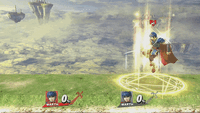
|
|---|
Taunts
- Up taunt: Points the Falchion skyward with a quick spark of light emitting at the tip. This is similar to his stance before he performed his Critical Hit animation in the Fire Emblem series and identical to his stance while performing his Lodestar technique.
- Side taunt: Swings the Falchion twice before sheathing it. Marth quickly unsheathes it before the taunt ends.
- Down taunt: Swings the Falchion downwards before holding it in front of his face, then going back to his idle pose. Marth says: みんな、見ていてくれ! ("Everyone, watch over me!" or in official Fire Emblem Fates English dub as "My prayers are with you!")
| Up taunt | Side taunt | Down taunt |
|---|---|---|
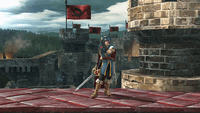
|
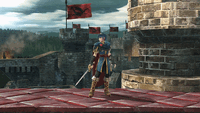
|
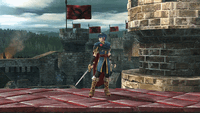
|
while doing so.
Idle poses
- Holds his hand to his chest, closes his eyes, and silently takes a breath.
- Brushes his hair out of his face.
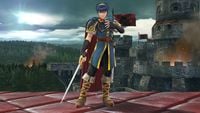 |
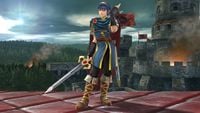
|
|---|
Crowd cheer
| English | Japanese | |
|---|---|---|
| Cheer | ||
| Description | Marth! Marth! Marth! | Ma-ru-su! |
| Pitch | Group chant | Group chant |
Victory poses
- Turns with pride, spins the Falchion then poses with it pointed to the ground, and says "今回は僕の勝ちだね?", which translates to "It's my victory this time around, right?"
- Poses with the Falchion sheathed and his right hand over his face before dramatically moving his arm away from his head while saying "僕は負ける訳には行かないんだ。", which translates to "I can't afford to lose." or in the official Fire Emblem Fates English localization as "I cannot afford to fail." Marth keeps a stern expression before smiling once the victory pose is over on the Nintendo 3DS version, while smiling throughout the entire pose on the Wii U version.
- Sheaths the Falchion and stands facing the camera, while saying "今日も生き延びることが出来た。", which translates to "Even today I was able to survive."
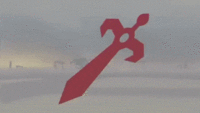 |
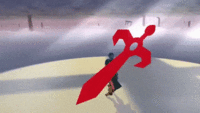 |
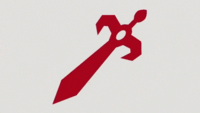
|
|---|
In competitive play
Official Custom Moveset Project
| Character | Custom sets available | ||||
|---|---|---|---|---|---|
| 3113 | 3123 | 1123 | 3133 | 1133 | |
| 3121 | 1121 | 3111 | 1131 | 3131 | |
Notable players
Active
AirVault - Ranked 9th on the Arizona Smash 4 Power Rankings; 7th at MVG Sandstorm.
False - Ranked 41st on the Panda Global Rankings v2, and 5th on the New Jersey Smash 4 Power Rankings; 1st at Midwest Mayhem 3, 7th at CEO 2016, 13th at 2GGT: KTAR Saga, and 17th at Pound 2016 and Get On My Level 2016.
Fuwa - One of Japan's best Marth players. Ranked 24th on the JAPAN Power Rankings; 2nd at Sumabato 13, 3rd at Karisuma 11, 5th at Waseda Festival 2016, and 9th at Umebura BenQ ZOWIE Cup. An excellent Doubles player with Earth; 1st at Karisuma 10, 2nd at Sumabato 14.
MKLeo - Widely considered to be the best Marth player in the world. Ranked 2nd on the Panda Global Rankings v3, and 1st on the Mexican Smash 4 Power Rankings; 1st at Smash Factor 5, Canada Cup 2016, 2GGT: ZeRo Saga, and GENESIS 4, 5th at Get On My Level 2016 and 2GGC: GENESIS Saga.
Mr.E - One of the world's best Marth mains. Ranked 28th on the Panda Global Rankings v4, and 2nd on the New York City Smash 4 Power Rankings; 1st at Glitch 2, 5th at Endgame and UGC Smash Open, 9th at The Big House 6, and 13th at EVO 2016.
Pugwest - One of the best Marth players worldwide. Ranked 39th on the Panda Global Rankings v2, and 2nd on the New England Smash 4 Power Rankings and the Rhode Island Smash 4 Power Rankings; 1st at GUMS 9, 9th at Showdown: Battle Royale, and 17th at EVO 2016. He and Marss comprise one of the best Doubles teams in the world; 3rd at The Big House 6, 4th at UGC Smash Open, 5th at GENESIS 3 and CEO 2016, and 9th at GENESIS 4.
Rizeasu - A master of diversity. One of Japan's best Marth players, though he also plays other characters in tournament. 4th at Karisuma 10 and Sumabato 15, 5th at Hirosuma 5, 9th at Sumabato 9 Sumabato 12, Karisuma Tokaigi Qualifiers and Sumabato 17. Ranked 23rd on the JAPAN Power Rankings.
Inactive
Nicko - Mains Shulk but has used Marth as a side character. 25th at Final Battle.
Tier placement and history
In the early lifespan of Smash 4, players quickly recognized the changes and nerfs to Marth's moveset, with players mostly picking up on his range; while still notable, and even improved in some aspects from Brawl, it was nowhere near as impressive due to other characters receiving significant range increases. This culminated in Marth being widely regarded poorly early on; however, Marth received small buffs in balance patches, and by the time of updates 1.0.8 and 1.1.0, Marth received some notable buffs that helped mitigate some of his initial issues, which contributed to the growth of his playerbase, thanks to dedicated players such as False, Mr.E and Pugwest. While Marth's results were still poor overall, the buffs improved his perception as a character, culminating in him being ranked 41st on the first 4BR tier list.
Marth would continue to improve with time, and gained his most significant buffs in updates 1.1.3 and 1.1.4. These buffs, supplemented with previous ones, allowed Marth's game to flow far more consistently, and allowed his playerbase to gain significantly better and more consistent results. His playerbase continued to grow significantly, with players like Fuwa gaining results in Japan, one of his driest regions for results. In the USA and Canada, Mr.E was able to place 5th at KTAR XVII, 17th at GOML 2016 and 13th at EVO 2016 (defeating ZeRo 2-1 in the latter tournament), while Pugwest placed 17th at Pound 2016 and EVO 2016, and False placed 17th at GOML 2016, with such results before the patch being almost unspoken of for him. Most notably, MKLeo begun bringing in abundant results: this included 1st place at Smash Factor 5 while using Marth through a majority of the tournament, and notably resetting the Grand Finals bracket against Mr.R's Sheik 3-0. Overall, Marth gained between the 12th and 16th best overall tournament results from patch 1.1.4 to present time, and all of these traits allowed Marth to rise to 19th on the second official tier list, gaining the second largest rise between the first and second tier lists.
While his placement on the second tier list was considered to be fairly accurate, some top players (e.g, ZeRo and Dabuz) believed Marth to be too low, and his increasing tournament success further called his placement into question: Leo won Canada Cup 2016 after beating Ally in very close sets of Grand Finals with Marth, he beat ZeRo 3-0 at 2GGT: ZeRo Saga in Losers Semi-finals and turned around a harsh deficit in Grand Finals against Larry Lurr using only Marth, and he won GENESIS 4 using Marth for the entirety of Top 8 (although he used Cloud exclusively prior to this). These even stronger results have helped Marth rise further in the third and current tier list, at 10th place, this tier rise being the third highest between the second and third tier lists.
However, while Marth has continued to perform well in the current metagame and has achieved strong results, his current placement has been recently disputed due to some smashers viewing Leo as the only Marth player to place very high at major tournaments, while Leo himself has used his other main, Cloud, more frequently over Marth. Mr.E has also began to use Lucina more often in tournament. In addition, characters ranked below him on the tier list such as Corrin have placed higher than Marth in tournaments as of late. As a result of this, Marth dropped one spot to 11th place, now sharing the spot with Ryu, though he certainly has noticeably improved during the lifespan of the game, and is arguably one of the characters that has developed the most, alongside Mewtwo.
Trophies
- Marth
The first hero from the Fire Emblem series, Marth is the prince of Altea and descendant of the hero Anri. In Smash Bros., he's known as an exceptional swordfighter, swinging his blade with grace. Striking with the tip will maximize the damage dealt. Teach aggressive foes a lesson with his strong Counter move.
Marth, the prince of Altea, is the hero of the first ever Fire Emblem game and its remake, Fire Emblem: Shadow Dragon. In this game, his graceful sword skills are what set him apart. Strike with the tip of his blade to deal extra damage, and use his Counter skill to defend yourself, no matter which directions you're being attacked from.
: Fire Emblem: Shadow Dragon and the Blade of Light (JP)
: Fire Emblem: Mystery of the Emblem (JP)
- Marth (Alt.)
Marth's side special, Dancing Blade, is a four-stage attack. Aim and time your strikes carefully! As usual, the tip of his sword does the most damage. For his up smash, Justice Sword, he thrusts his blade into the air. You can use it to block attacks from above, and even to launch nearby enemies off the ground."
: Fire Emblem: Shadow Dragon and the Blade of Light (JP)
: Fire Emblem: Mystery of the Emblem (JP)
- Critical Hit (Marth)
Marth raises his Exalted Falchion to the sky and then rushes forward to deal an incredibly powerful blow, almost certainly KO'ing anyone and everyone who gets hit! When it's used in the air, he'll fly forward a certain distance. On the ground, however, he'll only dash to the edge of the platform he's standing on.
Marth raises his Exalted Falchion to the sky, then rushes forwards to deal an incredibly powerful blow, almost certainly KOing anyone and everyone who gets hit! When used in the air, he'll fly forwards a set distance, but on the ground, he'll only dash up to the edge of the platform he's standing on.
- MarthTrophy3DS1.png
Classic (3DS)
- MarthTrophy3DS2.png
Alt. (3DS)
In Event Matches
Solo Events
- All-Star Battle: Melee: Marth is one of the opponents fought in this event. All opponents featured had debuted in Melee.
- In the Name of the Hero-King: Marth must defeat Lucina in a stamina battle.
- The Ultimate Swordsman: Marth is one of the seven opponents Ike must defeat.
- Unwavering Chivalry: Meta Knight must defeat Marth without KOing Peach or Zelda.
Co-op Events
- A Royal Errand: Marth and Robin must work together to collect 500G from Wario and Bowser in a coin battle before the stage reaches the Bazaar.
- The Ultimate Battle: Two players must select their characters and defeat the entire roster (prior to DLC).
Alternate costumes

| |||||||

|

|

|

|

|

|

|

|
Gallery
Marth's amiibo.
Battling with Link.
Using down smash on Wii Fit Trainer.
Using Dolphin Slash on Mega Man.
Posing with Peach.
Close-up image of Marth and Luigi's faces.
Marth and Samus near a Steel Diver.
In battle with Zelda.
Landing with Ike.
Trivia
- Despite now only grunting instead of talking when doing his Counter, the voice clips of him speaking are still in his Sound Test. Interestingly, Marth can be heard talking while countering in Roy's reveal trailer.
- Dashing Assault makes a "woosh" sound when used, but in Corrin's reveal trailer it makes the "shing" sound when executed, likewise when Marth performs his standard Shield Breaker.
- Marth, Roy and Cloud are the only characters to speak Japanese in every regional version of Super Smash Bros. 4.
- Marth's sword and its sheath are not present in his artwork for the cover of Super Smash Bros. for 3DS.
References
| Fighters in Super Smash Bros. 4 | |
|---|---|
| Veterans | Bowser · Captain Falcon · Charizard · Diddy Kong · Donkey Kong · Dr. Mario · Falco · Fox · Ganondorf · Ike · Jigglypuff · King Dedede · Kirby · Link · Lucario · Lucas · Luigi · Mario · Marth · Meta Knight · Mewtwo · Mr. Game & Watch · Ness · Olimar · Peach · Pikachu · Pit · R.O.B. · Roy · Samus · Sheik · Sonic · Toon Link · Wario · Yoshi · Zelda · Zero Suit Samus |
| Newcomers | Bayonetta · Bowser Jr. · Cloud · Corrin · Dark Pit · Duck Hunt · Greninja · Little Mac · Lucina · Mega Man · Mii Fighter (Mii Brawler · Mii Gunner · Mii Swordfighter) · Pac-Man · Palutena · Robin · Rosalina & Luma · Ryu · Shulk · Villager · Wii Fit Trainer |
|
| |
|---|---|
| Fighters | Marth (SSBM · SSBB · SSB4 · SSBU) · Roy (SSBM · SSB4 · SSBU) · Ike (SSBB · SSB4 · SSBU) · Lucina (SSB4 · SSBU) · Robin (SSB4 · SSBU) · Corrin (SSB4 · SSBU) · Chrom (SSBU) · Byleth (SSBU) |
| Assist Trophies | Lyn · Black Knight · Tiki |
| Stages | Castle Siege · Arena Ferox · Coliseum · Garreg Mach Monastery |
| Item | Killing Edge |
| Other | Sothis |
| Trophies, Stickers and Spirits | Trophies (SSBM · SSBB · SSB4) · Stickers · Spirits |
| Music | Brawl · SSB4 · Ultimate |
| Masterpieces | Fire Emblem: Shadow Dragon and the Blade of Light · Fire Emblem: Mystery of the Emblem |
